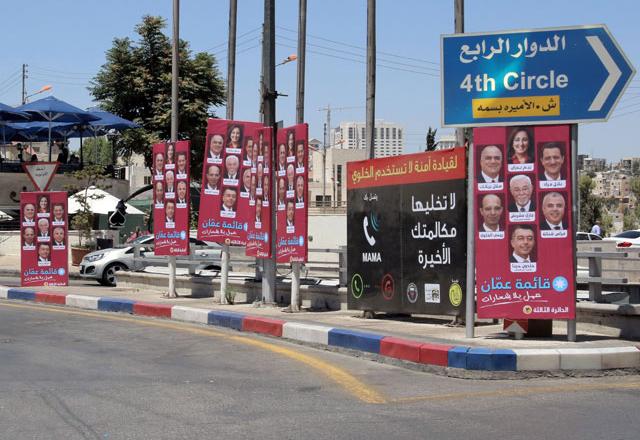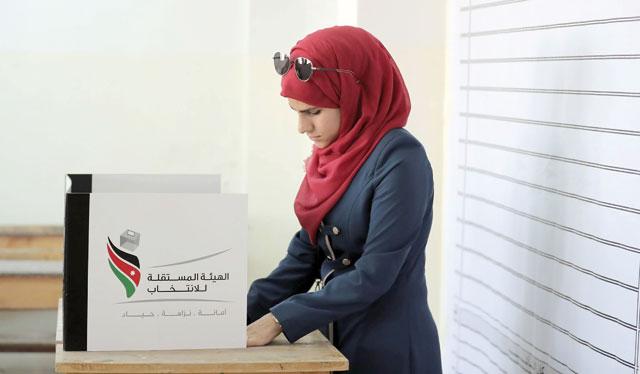You are here
Activists express ‘disappointment’ over low women representation in next Lower House
By Rana Husseini - Nov 13,2020 - Last updated at Nov 13,2020
AMMAN — Women’s rights activists on Thursday said that the disappointing results for women candidates in the parliamentary elections was expected due to “male dominance” on the proportional lists.
On Thursday, Independent Election Commission (IEC) IEC Chief Commissioner Khalid Kalaldeh announced during a press conference the official results of the elections saying that women won only 15 seats based on the quota system.
He also said that women voters’ turnout was low but did not elaborate on the figures.
During the 2016 elections, five females won seats in direct competition in addition to the 15 seats that were allocated to them via the women’s quota.
“The results are unfortunate but expected because the elections are basically money and tribes. It is not about the youth, women or political parties,” Solidarity Is Global Institute (SIGI) Executive Director Asma Khader said.
There is still stereotyping when it comes to women’s role and they do not have enough money, she said.
“We got many observations of their representatives who were offering money to vote for a certain male candidate and in general they have more financial abilities in terms of the campaign material and other costs,” Khader told The Jordan Times.
The male candidates treated women as their competitors this time because of the previous elections’ result that saw some of them losing to the females in their lists, Khader said.
“The road is still long and we need to increase the quota by at least 30 per cent, and this is an international figure that stipulates a change in the system,” Khader said.
Also, the Election Law needs to be amended to take into consideration the population density versus the allocated seats.
“Amman has the highest population figures but are only restricted to one seat for women, while in some governorates, the population is very low and the law still allocates a seat and this is not fair,” Khader noted.
Jordanian National Commission for Women's (JNCW) Secretary General Salma Nims added her voice to Khader saying that the results were expected given the current Election Law that is based on the lists system, “which minimises the chances of men and women to compete and the male candidates usually try to influence voters to vote only for them”.
Nims told The Jordan Times that the 2016 elections resulted in five females winning via direct competition, which “forced many males to choose female candidates whom they believed would not be strong enough to collect voices”.
“During the last elections, the male leaders of the list were not aware that women could win outside the quota system and were shocked when some of them won outside the quota and they did not,” Nims said.
That is why, Nims added, during this election the leaders of the list became more aware of this fact and formed their lists accordingly.
“Our Election Law is still based on patriarchal beliefs and that is why we demanded a seat for each of the 23 constituencies in 2016, but the legislators rejected our demands,” Nims added.
Some 1,386,749 (29.9 per cent) voters from the around 4.6 million eligible voters cast their ballots to elect representatives from 1,674 registered candidates, including 360 women.
Arab Women Organisation (AWO) Directors of Programmes Layla Naffa also expressed her dismay over the results saying that there were additional factors that played a role in the voting process this year.
“I believe that COVID-19 health concerns and the current situation forced many women to bear more responsibility at their homes and that is why they did not head to the polling stations to cast their ballots,” Naffa said.
In addition, Naffa said that for the past eight months, women were “invisible from the government and public life”.
“Women who are in decision-making positions barely appeared in government events or activities that were related to the COVID-19 pandemic, which made them disappear from the public scene,” Naffa added.
Meanwhile, SIGI issued a statement on Thursday saying that the results were “disappointing and constitute a backward step for the women’s movement”.
“This is the first time since 2007 that women do not win seats outside the quota,” the SIGI statement said.
In 2007, the SIGI statement said one woman won a seat outside the six-seat quota. In 2010, the women’s quota was increased to 12 seats, and one woman won through direct quota. In 2013, women won three seats in direct competition.
The SIGI statement also listed the names of the female winning candidates, their governorates and the total number of votes they received. They included the following: Amal Bashir from Irbid (9,771), Zeinab Musa from Southern Badia (6,814), Mayada Ibrahim from Amman (6,356), Rima Abul Eis from Mafraq (5,729), Safa Momani from Ajloun (4,817), Hadia Sarhan from Northern Badia (4,708), Dina Bashir from Balqa (4,348), Aysha Hassanat from Maan (3,366), Marwah Saoub from Karak (3,235), Abeer Jbour from the Central Badia (2,998), Raw’a Ghirbali from Aqaba (2,655) and Islam Tabashat from Tafileh (1,926).
Elections for the 19th Parliament were held following a Royal decree in July, directing the concerned authorities to hold parliamentary elections in accordance with the provisions of law.
Related Articles
AMMAN — The women’s movement has expressed optimism that some female parliamentary candidates could clinch seats outside the 15-seat designa
AMMAN — Activists on Thursday expressed mixed reactions to the parliamentary election results, as five women won seats outside the 15-seat q
AMMAN — Experts and activists on Tuesday praised the increase in number of women running for the upcoming elections, but said this could spl


















